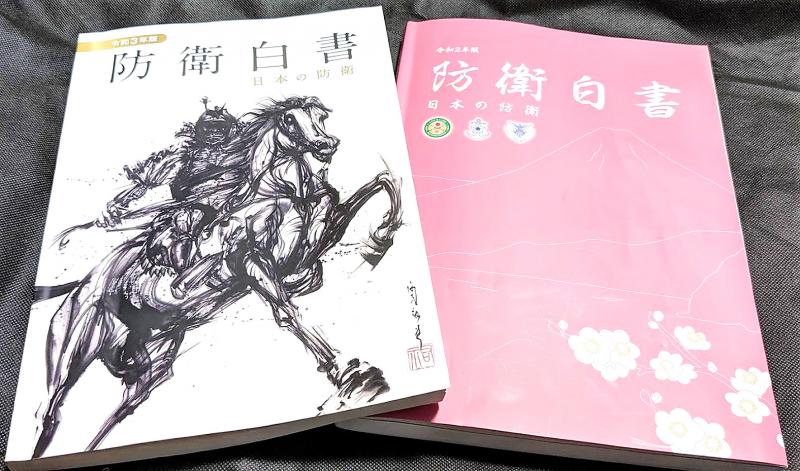Significant changes in Japan’s annual defense white paper, including for the first time a declaration of support for stability in the Taiwan Strait and separate treatment of Taiwan, show Tokyo’s growing affinity and respect for the nation.
The annual report approved by the Japanese Cabinet yesterday mentions China’s “intensified military activities around Taiwan,” including the incursion of Chinese aircraft in the nation’s southwestern airspace amid a growing military imbalance.
It also discusses the clarity of US support for Taiwan through warship transits and arms sales.

Photo: Lin Tsui-yi, Taipei Times
“Stabilizing the situation surrounding Taiwan is important for Japan’s security and the stability of the international community,” the paper says. “Therefore, it is necessary that we pay close attention to the situation with a sense of crisis more than ever before.”
The statement marks a significant shift from previous reports, which have refrained from providing a clear stance on Taiwan.
In the past few months, Tokyo has not been reticent in expressing its opinion that the Taiwan question should be resolved peacefully through dialogue, including in a joint statement with the US at a G7 summit last month.
While the Japanese Ministry of Defense has emphasized that the nation’s basic stance toward Taiwan has not changed, its treatment of the issue in the latest white paper says otherwise.
Perhaps most striking is its decision to move discussion of Taiwan from the chapter on China to a new section on US-China relations, adjusting an arrangement that has long drawn the ire of Taiwanese expat groups in Japan.
Critics have said that relegating Taiwan to a subsection on China could mislead readers into thinking that the Chinese People’s Liberation Army includes Taiwan’s military, when it is Taiwan’s largest and only enemy.
Even though the general focus of the section on US-China relations is on worsening confrontations between the two powers, it still manages to treat Taiwan as its own subject by detailing its developing relations with the US over the past year and military imbalance with China.
Mentioning that the balance is “tilting to China’s favor,” the report also recommends that attention be paid to the improvements of Chinese and Taiwanese forces, US arms sales to Taiwan and Taiwan’s indigenous military developments.
The report also corrects a map of Chinese military capabilities repeated in previous versions that expat groups have long protested should not include Taiwan.
It follows a similar correction of a COVID-19 map by the Japanese Ministry of Health, Labour and Welfare last year at the urging of expat groups.
International readers have also been granted consideration through small changes such as presenting years only in the Western format.
However, the clearest sign of the ministry’s change in stance can be seen in the cover design.
Thirty-four-year-old sumi-e artist Yu-ki Nishimoto was commissioned to design the cover, a bold depiction of a warrior on horseback, with the intention of attracting younger readers.
The image stands in sharp contrast to last year’s cover, a minimalist pink outline of Mount Fuji with cherry blossoms, which was itself a pronounced change from the report’s formerly rigid presentation.

Taiwan has received more than US$70 million in royalties as of the end of last year from developing the F-16V jet as countries worldwide purchase or upgrade to this popular model, government and military officials said on Saturday. Taiwan funded the development of the F-16V jet and ended up the sole investor as other countries withdrew from the program. Now the F-16V is increasingly popular and countries must pay Taiwan a percentage in royalties when they purchase new F-16V aircraft or upgrade older F-16 models. The next five years are expected to be the peak for these royalties, with Taiwan potentially earning

STAY IN YOUR LANE: As the US and Israel attack Iran, the ministry has warned China not to overstep by including Taiwanese citizens in its evacuation orders The Ministry of Foreign Affairs (MOFA) yesterday rebuked a statement by China’s embassy in Israel that it would evacuate Taiwanese holders of Chinese travel documents from Israel amid the latter’s escalating conflict with Iran. Tensions have risen across the Middle East in the wake of US and Israeli airstrikes on Iran beginning Saturday. China subsequently issued an evacuation notice for its citizens. In a news release, the Chinese embassy in Israel said holders of “Taiwan compatriot permits (台胞證)” issued to Taiwanese nationals by Chinese authorities for travel to China — could register for evacuation to Egypt. In Taipei, the ministry yesterday said Taiwan

POSITIVE DEVELOPMENT: Japan and the US are expected to hold in-depth discussions on Taiwan-related issues during the meeting next month, Japanese sources said The holding of a Japan-US leaders’ meeting ahead of US President Donald Trump’s visit to China is positive news for Taiwan, former Japan-Taiwan Exchange Association representative Hiroyasu Izumi said yesterday. After the Liberal Democratic Party’s landslide victory in Japan’s House of Representatives election, Japanese Prime Minister Sanae Takaichi is scheduled to visit the US next month, where she is to meet with Trump ahead of the US president’s planned visit to China from March 31 to April 2 for a meeting with Chinese President Xi Jinping (習近平). Japan and the US are expected to hold in-depth discussions on Taiwan-related issues during the

‘LIKE-MINDED PARTNER’: Tako van Popta said it would be inappropriate to delay signing the deal with Taiwan because of China, adding he would promote the issue Canadian senators have stressed Taiwan’s importance for international trade and expressed enthusiasm for ensuring the Taiwan-Canada trade cooperation framework agreement is implemented this year. Representative to Canada Harry Tseng (曾厚仁) in an interview with the Central News Agency (CNA) said he was increasingly uneasy about Ottawa’s delays in signing the agreement, especially as Ottawa has warmed toward Beijing. There are “no negotiations left. Not only [is it] initialed, we have three versions of the text ready: English, French and Mandarin,” Tseng said. “That tells you how close we are to the final signature.” Tseng said that he hoped Canadian Prime Minister Mark Carney